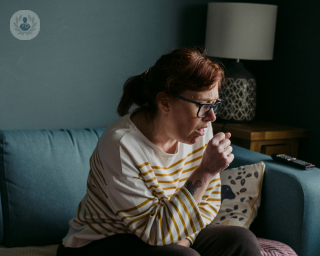Chest infection
Dr Anne Mier - Pulmonology & respiratory medicine
Created on: 03-20-2017
Updated on: 06-26-2023
Edited by: Aoife Maguire
What is a chest infection?
A chest infection is an infection of the lungs or lower large airways (bronchi) which are typically caused by bacteria, viruses, and more rarely other organisms. They cause fever, breathlessness, fatigue, and occasionally coughing up blood.
Most chest infections are mild and clear up without medication, whereas some can be severe and life-threatening.
Bronchitis and pneumonia are the two most common types of chest infections. Bronchitis is caused by a virus, whereas pneumonia is caused by bacteria.

What are the symptoms?
A chest infection typically follows the cold or flu. The symptoms can include:
- Chesty cough
- Coughing up yellow or green mucus
- Wheezing and shortness of breath
- Pain or discomfort in your chest
- A high temperature of 38C or above
- Headache
- Muscle aches
- Fatigue and tiredness
Symptoms are unpleasant but usually resolve on their own in seven to ten days. You can have a cough for up to three weeks.
What is the difference between a viral and a bacterial chest infection?
The symptoms of viral and bacterial chest infections are similar but the colour of any mucus coughed up may indicate the cause; white or clear mucus usually indicates a viral infection whereas green or yellow mucus suggests that the infection is bacterial.
What causes it?
A chest infection is caused by a bacterial or viral infection. You can catch these infections by breathing in infected respiratory droplets from someone sneezing or coughing near you. It is also possible to be infected by coming into contact with a surface that is contaminated with the virus or bacteria and then touching your face, mouth or eyes.
Who is at risk?
Anyone can get a chest infection, but some people are more at risk than others, especially if you:
- are pregnant
- are elderly
- are a baby or young child
- are a smoker
- have a chronic condition, such as diabetes, asthma and chronic obstructive pulmonary disease
- have a weakened immune system due to conditions such as HIV

How is it treated?
If you have a viral infection, you should focus on relieving symptoms until you start to feel better. Antibiotics don’t work to treat viral infections. However, if you have a bacterial infection, you can be treated with antibiotics.
There are some home tips and remedies for a chest infection which can help ease your symptoms:
- Take over-the-counter painkillers or anti-inflammatory medications to reduce your fever and relieve any aches and pains.
- Make sure you get plenty of rest.
- Take decongestants to loosen mucus around the chest. You can usually find these in your local pharmacy.
- Drink plenty of fluids to keep yourself hydrated.
- Sleep with your head and chest elevated to avoid the mucus settling on your chest. You can use extra pillows for this.
- Avoid smoking, pollution and other irritants.
- Use a humidifier or inhale steam vapor to relieve your coughing symptoms.
How long does a chest infection last?
Most chest infections clear up within seven to ten days. If your symptoms haven’t improved by then, you should make an appointment to see your doctor. Bear in mind, however, that your cough symptoms can last up to three weeks.
How can you prevent a chest infection?
There are some basic precautions you can make to prevent chest infections:
- Wash your hands regularly, especially before eating or touching your face, eyes and mouth.
- Get the flu vaccine. A chest infection can appear after having the flu, so you may want to talk to your doctor about getting the seasonal flu vaccine.
- Eat a well-balanced and healthy diet. This is one of the best ways you can boost your immune system and prevent infection.
- Avoid smoking and exposure to irritants.
- If you are already ill, make sure you cough and sneeze into a tissue, dispose of it properly and wash your hands with warm water and soap. Use an alcohol-based hand sanitiser if you don’t have access to soapy water.
When should I see a doctor about a chest infection?
If your symptoms persist over more than seven days, you should make an appointment with your doctor. The doctor will make a physical examination to assess your condition. This may include listening to your breathing with a stethoscope, as wheezing can be a sign of pneumonia which requires more serious treatment. If this pneumonia is suspected due to wheezing or a persistent cough (usually one that has lasted more than two months) a chest X-ray will be taken to investigate this further.
Based on your symptoms and the physical assessment, the doctor may prescribe antibiotics to clear up the infection if it appears to be bacterial.
What type of doctor treats a chest infection?
In the first instance, general practitioners and family doctors treat chest infections. Should the infection become more serious, pulmonologists and specialists in respiratory medicine will lead the treatment.















